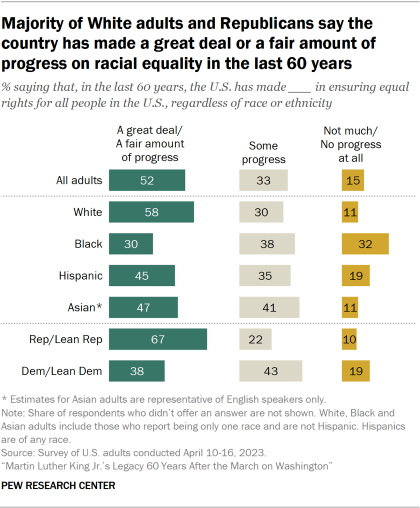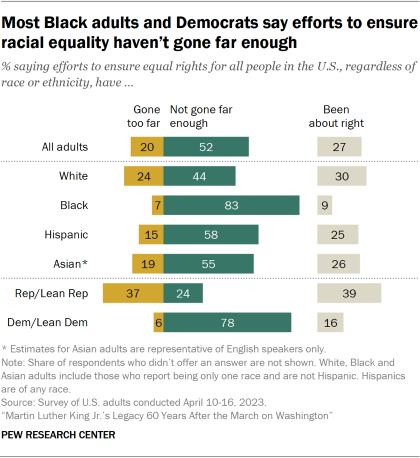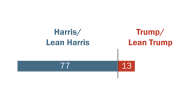About half of U.S. adults (52%) say that, in the last 60 years, the country has made a great deal or a fair amount of progress in ensuring equal rights for all people, regardless of race or ethnicity. A third say the country has made some progress, and 15% say the country hasn’t made much progress or any progress at all.
About half of adults (52%) also say efforts to ensure equal rights for all people haven’t gone far enough. About a quarter (27%) say efforts have been about right, while 20% say they’ve gone too far.
The country’s progress on racial equality in the last 60 years
By race and ethnicity

White adults are the most likely to say the country has made a great deal or a fair amount of progress in ensuring racial equality (58% say this). In turn, Black adults are the least likely to say there’s been a lot of progress (30%).
About a third of Black Americans (32%) say the country hasn’t made much progress or any progress at all on racial equality in the last 60 years. This is larger than the shares of Hispanic (19%), White (11%) and Asian (11%) Americans who say the same.
By partisanship
Two-thirds of Republicans and those who lean Republican say the country has made a great deal or a fair amount of progress on racial equality in the last 60 years. A far smaller share (38%) of Democrats and those who lean Democratic say the same.
Democrats are about twice as likely as Republicans (19% vs. 10%) to say there hasn’t been much progress or there’s been no progress at all on this.
Ideological differences among Republicans
About seven-in-ten conservative Republicans (72%) say the country has made a lot of progress on racial equality in the last 60 years. A smaller majority of moderate and liberal Republicans (59%) share this view.
There is no difference on this question between liberal Democrats and moderate and conservative Democrats.
CORRECTION (Sept. 29, 2023): In a previous version of this report, the chart “Majority of White adults and Republicans say the country has made a great deal or a fair amount of progress on racial equality in the last 60 years” included the wrong figure for the share of Asian adults who say the country has made not much or no progress in ensuring equal rights for all people in the U.S. The report text cited the correct figure (11%).
Efforts to ensure equal rights for all, regardless of race or ethnicity
By race and ethnicity

A large majority of Black Americans (83%) say efforts to ensure equality haven’t gone far enough. This compares with 58% of Hispanic Americans, 55% of Asian Americans and 44% of White Americans.
About a quarter of White Americans (24%) say these efforts have gone too far. Some 19% of Asian Americans and 15% of Hispanic Americans agree, compared with 7% of Black Americans.
By partisanship
About eight-in-ten Democrats (78%) say efforts to ensure racial equality haven’t gone far enough. Views are more divided among Republicans: 24% agree that these efforts haven’t gone far enough, while larger shares say they’ve gone too far (37%) or have been about right (39%).
Ideological differences among Republicans and Democrats
Some 43% of conservative Republicans say efforts to ensure racial equality have gone too far; 41% say these efforts have been about right; and 15% say they haven’t gone far enough.
Among moderate and liberal Republicans, more say these efforts haven’t gone far enough (38%) or have been about right (35%) than say they’ve gone too far (27%).
While large majorities of Democrats across ideologies say efforts to ensure equality haven’t gone far enough, liberal Democrats (86%) are more likely moderate and conservative Democrats (71%) to say this.
The future of racial equality
Thinking about the future, more Americans say they are pessimistic (44%) than say they are optimistic (28%) about the country’s ability to ensure equality for all people, regardless of race or ethnicity.
We also asked people who say efforts to ensure racial equality haven’t gone far enough or have been about right if they think there will be equality in their lifetime. Those who say efforts to ensure equal rights haven’t gone far enough are particularly pessimistic – a majority (58%) say racial equality is unlikely, while 33% say it’s somewhat likely and only 8% say it’s extremely or very likely.

Among those who say efforts to ensure equality have been about right, 39% say it’s extremely or very likely that there will be racial equality in the U.S. in their lifetime; 36% say it’s somewhat likely; and 24% say this is unlikely to happen.
Opinions on this don’t vary much by race or ethnicity among those who say efforts to ensure equality haven’t gone far enough. (The number of Black, Hispanic and Asian adults who say efforts have been about right is too small to analyze separately.) There are also no major differences by party among those who say efforts haven’t gone far enough.
Among those who say efforts to ensure equality have been about right, Republicans (46%) are more likely than Democrats (29%) to say it’s extremely or very likely that there will be racial equality in their lifetime. In turn, 31% of Democrats in this group say this is unlikely, compared with 19% of Republicans.




